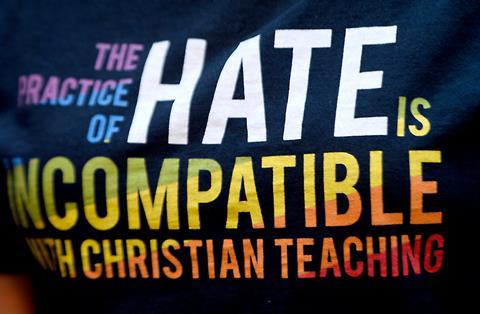At its most recent conference in the USA, the United Methodist Church removed the prohibition on considering openly LGBT candidates for ordained ministry. There’s a growing divide between Africa and the West on sexuality, reports Winile Ximba

The Methodist Church in Africa has been thrown into an existential crisis over a decision by its US counterpart to allow practising homosexual men and women to become ministers.
African Methodists have found themselves wedged between a rock and a hard place as a split from the wealthier US Methodists could mean a drying up of desperately needed humanitarian money.
Liberal times
The United Methodist Church, one of the largest Protestant denominations in the world, voted in May to overturn its ban on allowing gay clergy to preach and permitting its ministers from officiating at same-sex weddings. “All of this means that United Methodist clergy are now free to preside at same-sex marriage or union ceremonies where they are legal, and they are equally free,” announced the Church.
The new legislation will not be forced on individual churches. Instead, the church said the ruling “holds space for differing opinions”.
But Methodists strongly opposed the move, arguing that homosexuality is “incompatible” with Christian and biblical teaching. The Zimbabwe United Methodist Church, a flag-bearer for the continent’s mutiny has vowed to resist the policy.
“We will not solemnize gay marriage as the Church,” the resident bishop of the Zimbabwe Episeopal Area, Bishop Eben Nhiwatiwa, vowed in a rebellious communiqué to the United Methodist Church family in Zimbabwe.
At the US General Conference, the African Methodists, led by Zimbabwe, lost the vote to allow gay clergy and officiating at same-sex marriages. All Methodist churches around the world may vote in this conference as regional blocs coming from different continents, but 70 United Methodist delegates from the African continent were unable to attend due to visa issues.
“We, United Methodist in Zimbabwe, will maintain that homosexuality is incompatible with Christian teaching. This is the teaching of the Bible and no resolution can change that,” stated Bishop Eben.
A split looks imminent if the African Methodists continue rebelling against the mother body.
Permitting the Methodist Church in African nations such as Zimbabwe to appoint gay clergy and solemnize same-sex marriage has risky real-life implications. This is because African countries are dangerous places to be gay, or even to be suspected. In 2023, Uganda passed what was dubbed ‘the world’s harshest anti-LGBT law’, which permits the death penalty in some cases. That decision was taken in defiance of Western rebuke, and aid cutoff threats by the EU and US.
In Zimbabwe, being openly gay also has costly implications. The country levies lengthy jail penalties for any ‘homosexual acts’. This means African Methodists - whether ministers or congregants - could open themselves to assault, state surveillance, or prosecution if they are perceived to be in tune with the liberal stance taken by the United Methodist Church.
Defections?
The Methodist Church in Africa also risks losing ordinary members, and worshippers, if they are seen to obey the US conference resolution.
There is a precedent for this. Zimbabwe used to make up one of the largest branches of Anglicanism in the continent of Africa. But in 2011, many Anglicans in Zimbabwe split from the global Anglican body when Anglicans in the US permitted gay bishops. This led to an ugly fight over church assets in Zimbabwe, from which Anglican unity has never recovered.
Given this history, Methodists in Zimbabwe are bracing not only for a split, but potentially empty pews and pulpits.
A tight-rope
Another harsh new reality may also await Africa’s Methodists if they defy the US decision.
That’s because church aid matters in the world’s most poverty-stricken continent. In 2022 alone, the Methodist Church in the US handed out $3m in grants to branches across Africa to support agriculture. This church aid is how many Africans - whether Christian or not - gain access to free school nutrition, HIV medication, free education, clean water, startup loans for farming, and church humanitarian jobs in countries where state presence is severely weak. The church is arguably far more helpful than the state in the day-to-day lives of many Africans.
A hasty African split could mean the drying up of aid. The US has not yet threatened this, but observers and church insiders fear this could eventually happen if the Africans stage a split. It would mean hunger, drying up of orphans’ funds, free education, and medication for the vulnerable. It could bankrupt Africa’s Methodist branches.
The US General Conference decision has created a tightrope to walk for both sides. Too much is at risk.



































No comments yet